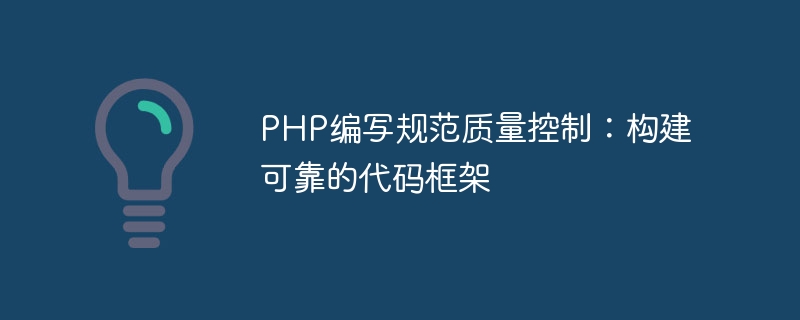Home >Backend Development >PHP Tutorial >PHP writing standard quality control: building a reliable code framework
PHP writing standard quality control: building a reliable code framework
- 王林Original
- 2023-08-13 13:28:451297browse

Quality control of PHP writing specifications: building a reliable code framework
Introduction
In the development process, writing standardized code is very important. Good code specifications can improve the readability, maintainability and scalability of the code, and can also help team members collaborate better. This article will introduce some best practices for quality control of PHP writing specifications and use code examples to illustrate. By building a reliable code framework, we can effectively improve the quality of the project.
1. Naming conventions
Good naming conventions can make the code more readable and express the intention of the code.
- Classes, interfaces and namespaces use camel case naming with the first letter capitalized, for example: ClassExample, InterfaceExample.
- Variables and functions use lowercase camel case naming, such as: $variableExample, functionExample.
- Use capital letters and underscores for constants, for example: CONSTANT_EXAMPLE.
Sample code:
class CodeExample
{
const CONSTANT_EXAMPLE = 'constant value';
private $variableExample;
public function functionExample()
{
// Function body goes here
}
}2. File structure and organization
Good file structure and organization can improve the readability and maintainability of the code.
- Each class and interface should be stored in a separate file, and the file name should be consistent with the class name or interface name.
- There should be appropriate blank lines between functions and methods to distinguish different function blocks.
Sample code:
// ClassExample.php
class ClassExample
{
// Class body goes here
}
// InterfaceExample.php
interface InterfaceExample
{
// Interface body goes here
}3. Comment specifications
Good comment specifications can improve the readability and maintainability of the code, and can help developers understand The intent and function of the code.
- The file header should contain basic information about the file, such as author, creation date, etc.
- Classes, interfaces, and methods should have appropriate annotations describing their functionality and purpose.
- Key places in the code should have comments to help other developers understand the code.
Sample code:
<?php
/**
* ClassExample.php
*
* This is an example class that illustrates the usage of PHP coding standards.
*
* @author John Doe
* @created 2021-09-01
*/
/**
* Class ClassExample
*
* This class represents an example class.
*/
class ClassExample
{
/**
* This is a public function example.
*
* @param int $param This is the input param for the function.
* @return int This is the output of the function.
*/
public function functionExample($param)
{
// Function body goes here
}
}Conclusion
By following good writing practices and quality control methods, we can build a reliable code framework and improve the quality of the project . When writing code, pay attention to naming conventions, file structure and organization, and comment conventions. These best practices not only improve code readability and maintainability, but also help team members collaborate better. I hope the content of this article is helpful to you, let's build high-quality PHP code together!
The above is the detailed content of PHP writing standard quality control: building a reliable code framework. For more information, please follow other related articles on the PHP Chinese website!
Related articles
See more- Getting Started with PHP: Code Quality Control
- 构建质量控制报表功能的企业资源计划(ERP)系统的PHP开发
- PHP development for building enterprise resource planning (ERP) systems with quality control functions
- Core principles of PHP writing specifications: ensuring code readability and maintainability
- Interpretation of PHP writing specifications: an essential guide to standardizing the development process

